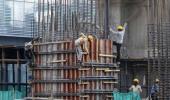India will need an annual investment of about Rs 15 trillion in infrastructure over the next five years, says Chandrajit Banerjee, Director General, Confederation of Indian Industry.

Photograph: Amit Dave/Reuters
The Union Budget is being presented at a time when India's economic growth is likely to have bottomed out.
The game-changing Goods and Services Tax has been implemented successfully, albeit with some implementation hurdles which are being sorted out.
Along with GST, various other reforms and policies have been implemented with the intent of building a more productive and efficient economy.
In this backdrop a focus on development of infrastructure and raising resources for financing the infrastructure push should be one of the Budget's highlights.
As per our estimate, as much as Rs 10 trillion to Rs 15 trillion of annual investment in infrastructure over the next five years will be needed to sustain the desired rate of economic growth.
This expenditure must be judiciously divided between the public and private sectors, with the latter being brought into sectors and projects where earning returns is feasible.
However, the conditions have to be right for the private sector to invest.
Projects should be awarded to the private sector only after securing key sovereign clearances.
Large amount of resources that are currently locked in arbitration need to be freed up by ensuring contractual sanctity and an effective dispute resolution mechanism.
Implementing the Kelkar Committee recommendations on revitalising the public-private partnership model could be a good start.
Of course, public spending needs to be the key driver.
It can be amplified substantially not only in frontal sectors like roads, railways and waterways, but also in sectors such as public housing and agri-infrastructure.
The private sector can supplement the government's effort in infrastructure projects in many ways.
A sound policy on asset recycling could help generate funds needed by the government.
Identified public assets can either be marked for outright sale or leasing out for operation and maintenance to specialised private players, much like the TOT (Toll-Operate-Transfer) model of the National Highways Authority of India.
Availability and procurement of land remains a contentious issue.
Multiple planned and upcoming projects are facing hurdles in urban and semi-urban areas, leading to projects being stalled or capital locked in arbitration.
The Confederation of Indian Industry has suggested the setting up of a Land Bank Corporation which can act as a definitive publicly available inventory of central government land holdings.
Multiple public entities such as the railways, airports, defence services and port authorities and so on can hold land parcels in prime urban spaces, which are often underutilised.
A Land Bank Corporation will lead to increase in transparency with regard to monetisation of such land parcels.
Such an inventory should have all details of each land parcel, including legal title and restrictions, if any.
While industry will get access to all available resources, public entities will be able to attract a better value for their assets, thus benefiting both parties.
Electricity and power is an important sector for a growing economy, but is facing stress.
There is lack of demand from distribution companies for thermal power, leading to increase in stranded assets and rise in NPAs from the power sector.
Thermal power is facing stiff competition from renewables, which have become cheaper in recent years, leading to increased pressure for renegotiation of longer-term power purchase agreements.
We at CII have suggested the setting up of a National Power Distribution Company on the 'one nation, one market' philosophy, much like GST.
State-level distribution companies tend to buy power from the cheapest source, overlooking long-term strategic and diversification concerns, something an NPDC can help overcome.
A national power distribution company could help in many ways, by a. ensuring minimum off-take of power from stranded capacities; b. creating a unified market for power by acting as a national price point; and c. addressing strategic concerns around diversification of power generation.
The government should also address the financial viability of the sector, as NPAs of power generators and loans of state distribution companies are having an adverse impact on state budgets.
There is an urgent need to upgrade railway infrastructure and increase the number of freight wagons. At present, we face a shortage of wagons, which in any case need modernisation.
A government policy for procuring new-generation freight wagons from the private sector could be a boon for the sector.
First, it would free up additional resources towards the upgrade and maintenance of railway infrastructure.
Second, it would likely earn more revenues for Indian Railways through increased haulage.
The third benefit would be to increase the supply of wagons for IR customers who otherwise would have considered road transport alternatives.
Additionally, Indian wagon manufacturers will be revived with new orders, new technologies and new designs, thereby giving a huge fillip to the Make in India programme.
Over the past three years, the government has brought in various reforms such as demonetisation, GST, the Banking Regulation (Amendment) Act, the Real Estate Regulatory Authority and initiatives such as ease of doing business, infrastructure investment and bank recapitalisation, along with a host of other social reforms aimed at building a solid foundation for the economy to grow and prosper.
All these measures have instilled hope and optimism for the future, along with increased expectations from the government for the upcoming year.
Industry is hopeful that this track record will be continued, with promising initiatives to be taken in the Union Budget for 2018-19.
- Complete Coverage: Jaitley's final full Budget













 © 2025
© 2025